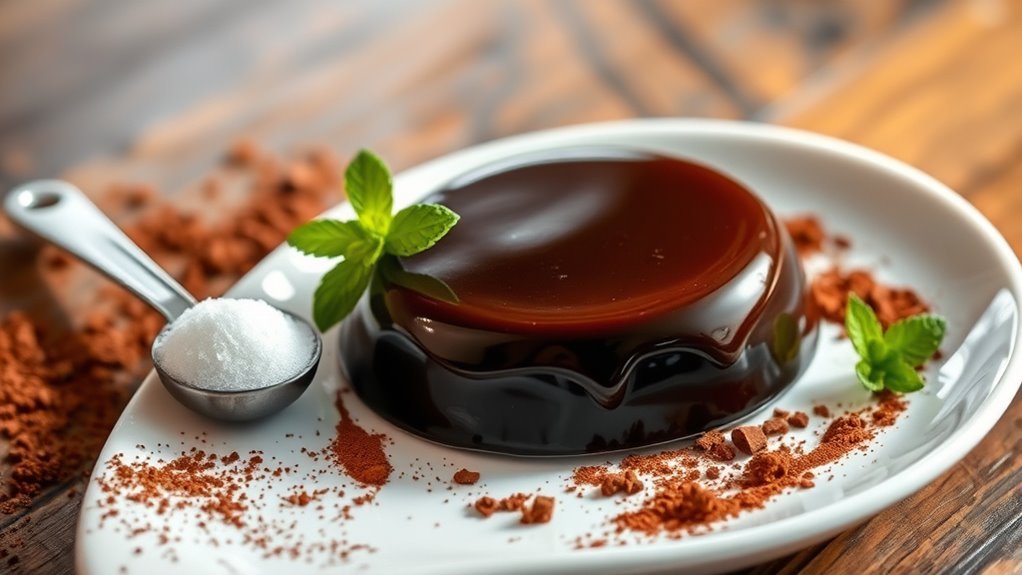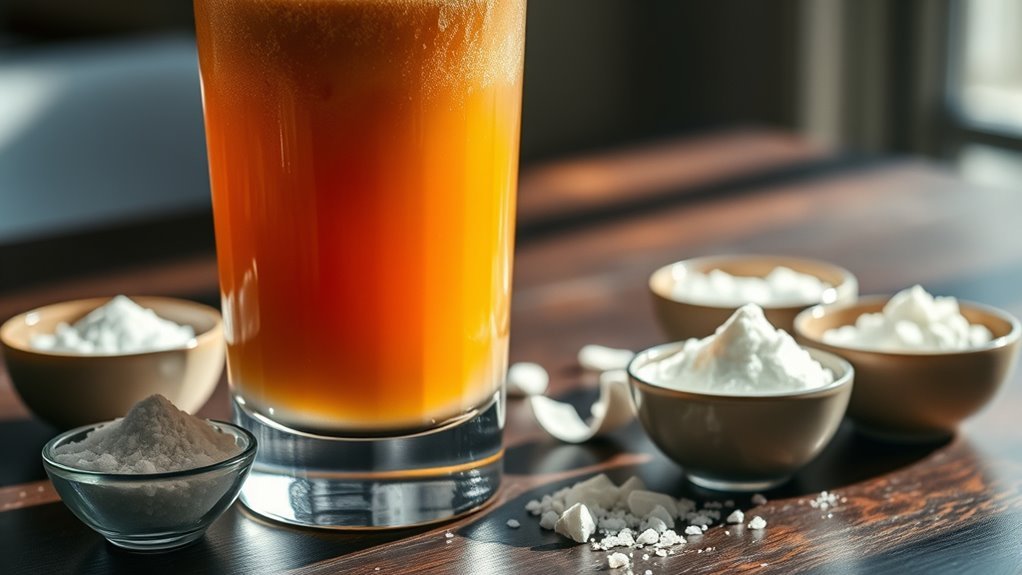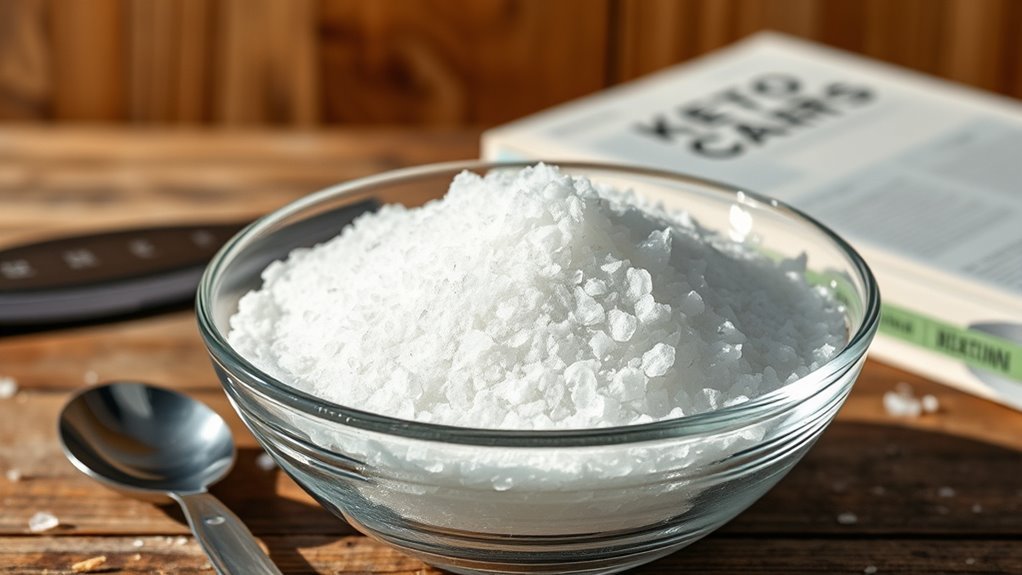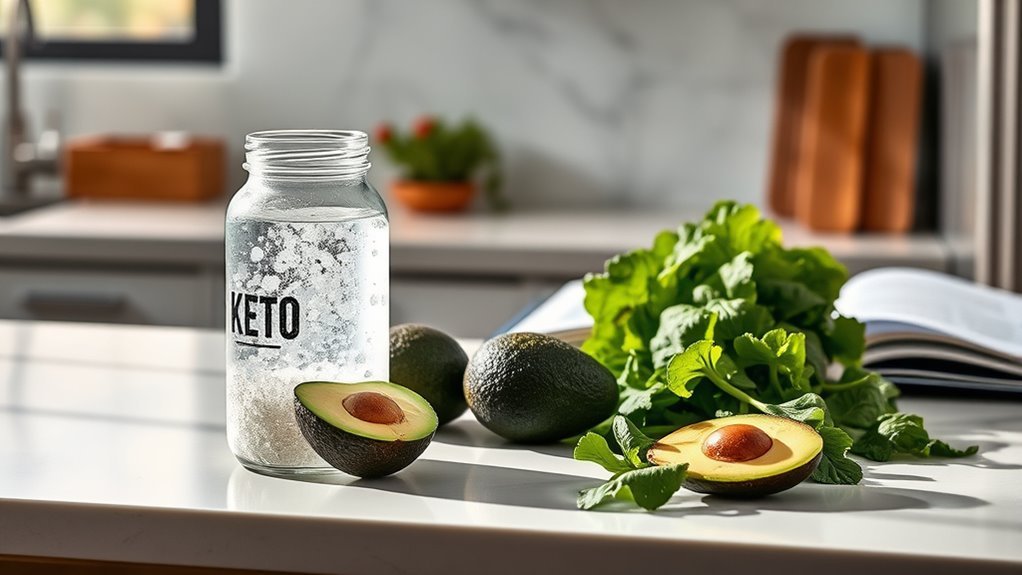Sugar alcohols can count as carbs on a keto diet, but their impact varies based on the type you choose. For instance, erythritol has minimal effect on your blood sugar, while others like xylitol can spike insulin levels. It’s essential to take into account net carbs when tracking intake and aim for a daily limit of 15-20 grams to avoid digestive issues. Want to know more about how to incorporate them effectively into your keto lifestyle?
What Are Sugar Alcohols?

Sugar alcohols, often found in low-calorie and sugar-free products, are a type of carbohydrate that can provide sweetness with fewer calories than traditional sugars. They offer numerous health benefits, such as lower blood sugar spikes, which can be particularly appealing if you’re managing diabetes or following a low-carb lifestyle. However, you should be aware of their digestive effects. Consuming sugar alcohols in moderation is key, as they can cause bloating or digestive discomfort in some people. This is due to their incomplete absorption in the intestine. By incorporating sugar alcohols wisely into your diet, you may enjoy the freedom to satisfy your sweet tooth without greatly impacting your calorie intake or blood sugar levels.
Common Types of Sugar Alcohols

When it comes to sugar alcohols, you might encounter popular types like erythritol, xylitol, and sorbitol. Each of these has a different carbohydrate content and can impact your body’s ketosis differently. Understanding these differences can help you make informed choices about your diet.
Popular Sugar Alcohols
A variety of sugar alcohols are commonly used as low-calorie sweeteners in many food products. If you’re exploring options for your diet, here are three popular sugar alcohols that appeal to consumer preferences:
- Erythritol: Known for its clean taste, erythritol has become a favorite among popular brands, often found in keto snacks and sugar-free desserts.
- Xylitol: Often used in gum and dental products, xylitol not only sweetens but also promotes oral health, making it a unique choice for health-conscious consumers.
- Sorbitol: Frequently added to sugar-free candies and baked goods, sorbitol offers a mild sweetness and is well-tolerated by most people.
These sugar alcohols provide alternatives to traditional sugars, catering to those seeking lower-calorie options without sacrificing flavor.
Carbohydrate Content Comparison
Understanding the carbohydrate content of popular sugar alcohols can help you make informed choices for your diet. When carb counting, it’s essential to check nutritional labels for accurate information. Common sugar alcohols include erythritol, xylitol, and maltitol, each with different carb counts. Erythritol has about 0.2 grams of carbs per teaspoon, making it a great option for keto diets, as it’s often subtracted from total carb counts. Xylitol contains around 2.4 grams, while maltitol has about 2.1 grams per teaspoon, which can impact your carb limit. By knowing these values, you can navigate your food choices better and enjoy sweet treats without derailing your goals. Always read nutritional labels to stay on track with your dietary needs.
Impact on Ketosis
While sugar alcohols can be a sweet alternative for those on a ketogenic diet, their impact on ketosis varies greatly among different types. Understanding which sugar alcohols can support your ketosis maintenance is essential. Here are three common types and their effects:
- Erythritol: Often considered the best option, it has minimal effect on blood sugar and insulin levels, making it keto-friendly.
- Xylitol: This one can spike insulin levels more than erythritol, so moderation is key for maintaining ketosis.
- Maltitol: Generally not recommended on keto, as it greatly impacts blood sugar and can hinder ketosis maintenance.
Choosing the right sugar alcohol can help you enjoy sweet treats without derailing your progress.
How Sugar Alcohols Are Metabolized

When you consume sugar alcohols, your body metabolizes them differently than regular sugars. Unlike glucose, which is rapidly absorbed and spikes your blood sugar, sugar alcohols undergo a more gradual process. They’re partially absorbed in the small intestine and metabolized into energy, but this process is slower and less efficient. This means that less of the sugar alcohols translate directly into glucose, impacting sugar metabolism and reducing the immediate energy utilization you’d get from traditional carbs. As a result, your body may not experience the same insulin response, which can be a liberating factor for those seeking to maintain ketosis. Understanding this unique metabolism can help you make informed choices while enjoying sweet flavors without compromising your goals.
The Impact of Sugar Alcohols on Blood Sugar Levels
Although sugar alcohols are often used as low-calorie sweeteners, their impact on blood sugar levels can be markedly different from that of traditional carbohydrates. Here’s what you should know:
- Lower Glycemic Index: Sugar alcohols generally have a minimal effect on blood sugar compared to regular sugar, leading to a lower glycemic response.
- Reduced Insulin Response: Since they don’t spike blood sugar as much, your body may release less insulin, which is beneficial for those managing their weight or insulin levels.
- Individual Variability: Everyone’s body reacts differently, so it’s important to monitor how sugar alcohols affect your blood sugar personally.
Net Carbs and Sugar Alcohols
Understanding how sugar alcohols fit into your carbohydrate intake is key for those monitoring their diet. When you’re on a keto diet, net carb calculations help you keep track of your carb consumption. Sugar alcohols, like erythritol and xylitol, are often considered keto friendly sweeteners because they typically have a minimal effect on blood sugar levels. However, their impact varies—some may contribute more to your net carbs than others. For instance, erythritol has nearly zero calories and carbs, so it’s subtracted entirely in net carb calculations. Knowing which sugar alcohols to choose can give you the freedom to enjoy sweet treats without derailing your keto goals. Always read labels to stay informed about their carb content.
Recommended Daily Intake of Sugar Alcohols
When considering sugar alcohols, it’s crucial to be aware of the recommended daily intake. Most experts suggest limiting consumption to around 50 grams per day to avoid gastrointestinal discomfort. However, individual tolerance can vary, so it’s important to listen to your body and adjust accordingly.
Daily Limit Guidelines
Maneuvering the recommended daily intake of sugar alcohols can help you maintain a balanced diet while managing your carbohydrate consumption. Understanding sugar alcohol guidelines is essential for staying within your daily carbohydrate allowance. Here are three key points to take into account:
- Daily Limit: Aim for no more than 15-20 grams of sugar alcohols per day to avoid digestive discomfort.
- Net Carbs: Remember that not all sugar alcohols affect your blood sugar equally; erythritol, for example, is often excluded from net carb calculations.
- Listen to Your Body: Monitor how your body reacts to sugar alcohols and adjust your intake accordingly.
Health Considerations
Considering your daily limit of sugar alcohols is just the beginning; it’s also crucial to recognize how they can impact your health. While sugar alcohols can be a low-calorie alternative for sweetening, consuming them in excess can lead to significant health risks. Most sources recommend limiting your intake to around 20-30 grams per day. Exceeding this amount may trigger digestive issues, such as bloating and diarrhea, especially if you’re sensitive to them. It’s vital to listen to your body and adjust your intake accordingly. Balancing your diet with whole foods and being mindful of sugar alcohol consumption can help you enjoy the benefits without compromising your health. Remember, moderation is key to maintaining your freedom and well-being.
Benefits of Using Sugar Alcohols on Keto
Although you might be cautious about your carb intake on a keto diet, incorporating sugar alcohols can offer significant benefits. Here are three key advantages:
- Lower Caloric Content: Sugar alcohols generally have fewer calories than regular sugar, helping you maintain your caloric goals while enjoying sweetness.
- Minimal Impact on Blood Sugar: They have a reduced glycemic index, meaning they cause less fluctuation in blood sugar levels, which is ideal for keto.
- Health Benefits: Some sugar alcohols, like erythritol, can promote dental health and may even have antioxidant properties.
While these sugar substitutes can enhance your keto experience, it’s important to monitor your body’s digestive effects. Enjoying sugar alcohols can provide freedom and satisfaction without derailing your dietary goals!
Potential Side Effects of Sugar Alcohols
While sugar alcohols can be a great addition to your diet, they may come with some potential side effects that you should be aware of. Many people experience digestive issues, like bloating, gas, or diarrhea, especially when consuming them in large amounts. This happens because sugar alcohols aren’t fully absorbed in the intestines, leading to fermentation by gut bacteria. Additionally, some individuals might have allergic reactions, ranging from mild to severe, depending on their sensitivity. If you notice any unusual symptoms after consuming sugar alcohols, it’s smart to consult a healthcare professional. Moderation is key, as your body may react differently than others. Knowing these potential side effects can help you enjoy sugar alcohols while minimizing discomfort.
Incorporating Sugar Alcohols Into Your Keto Diet
If you’re following a keto diet and craving something sweet, incorporating sugar alcohols can be a smart way to satisfy your taste buds without derailing your carb count. Here are some sugar alcohols benefits and keto friendly options to take into account:
- Low-Calorie Sweetener: Many sugar alcohols, like erythritol, contain fewer calories than regular sugar, helping you maintain your caloric deficit.
- Minimal Impact on Blood Sugar: Sugar alcohols typically have a low glycemic index, making them safe for keeping your blood sugar stable.
- Variety of Uses: You can use sugar alcohols in baking, cooking, or even in beverages, allowing for diverse keto-friendly recipes.
Frequently Asked Questions
1. Do sugar alcohols count as carbs on a keto diet?
Yes, sugar alcohols do count as carbs, but the impact they have on your net carb intake can vary. While sugar alcohols contain carbohydrates, they are not fully absorbed by the body and thus have a lower glycemic index. Many keto dieters calculate net carbs by subtracting fiber and certain sugar alcohols from the total carbohydrate count. However, it’s essential to check the specific type of sugar alcohol, as some, like erythritol, have minimal effects on blood sugar levels, while others can impact ketosis differently.
2. Are all sugar alcohols the same in terms of carb content?
No, not all sugar alcohols are created equal. Common types of sugar alcohols include erythritol, xylitol, maltitol, and sorbitol. Erythritol has 0.2 calories per gram and is often subtracted entirely from net carb counts because it does not spike insulin levels. In contrast, maltitol has a higher glycemic index and can affect blood sugar more significantly, so it may not be advisable to count it as zero carbs on a keto diet.
3. How do I calculate net carbs when using products containing sugar alcohols?
To calculate net carbs, you can use the following formula: Net Carbs = Total Carbohydrates – Fiber – Sugar Alcohols (if applicable). For sugar alcohols, only certain types like erythritol are generally subtracted entirely, while others, such as maltitol, should have half their grams counted. Always read nutrition labels carefully to determine how much impact each type of sugar alcohol may have on your daily carb limit.
4. Can sugar alcohols cause digestive issues on a keto diet?
Yes, sugar alcohols can cause digestive issues for some individuals, particularly when consumed in large amounts. Common side effects include bloating, gas, and diarrhea. This is especially true for sugar alcohols like sorbitol and maltitol, which can have a laxative effect. It’s advisable to start with small amounts to assess your tolerance and choose products that contain erythritol, as it tends to be better tolerated by most people.
5. Are there any benefits to using sugar alcohols on a keto diet?
Yes, using sugar alcohols can offer several benefits on a keto diet. They provide a sweet taste without significantly affecting blood sugar levels, making them a popular choice for those looking to satisfy their sweet tooth while maintaining ketosis. Additionally, many sugar alcohols have fewer calories than regular sugars, which can help with weight management. However, it’s crucial to consume them in moderation to minimize potential digestive discomfort.
References
- https://www.ncbi.nlm.nih.gov/pmc/articles/PMC5693608/
- https://www.healthline.com/nutrition/sugar-alcohols
- https://www.webmd.com/diet/what-are-sugar-alcohols
- https://www.hhs.gov/opa/sites/default/files/2020-12/sugar-alcohols.pdf
- https://www.nutrition.gov/topics/nutrition-101/sugar-alcohols
- https://www.researchgate.net/publication/327039912_Sugar_alcohols_and_their_application_in_food_products
- https://www.cdc.gov/nutrition/data-statistics/know-your-limit-for-added-sugars.html


